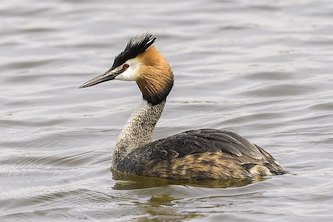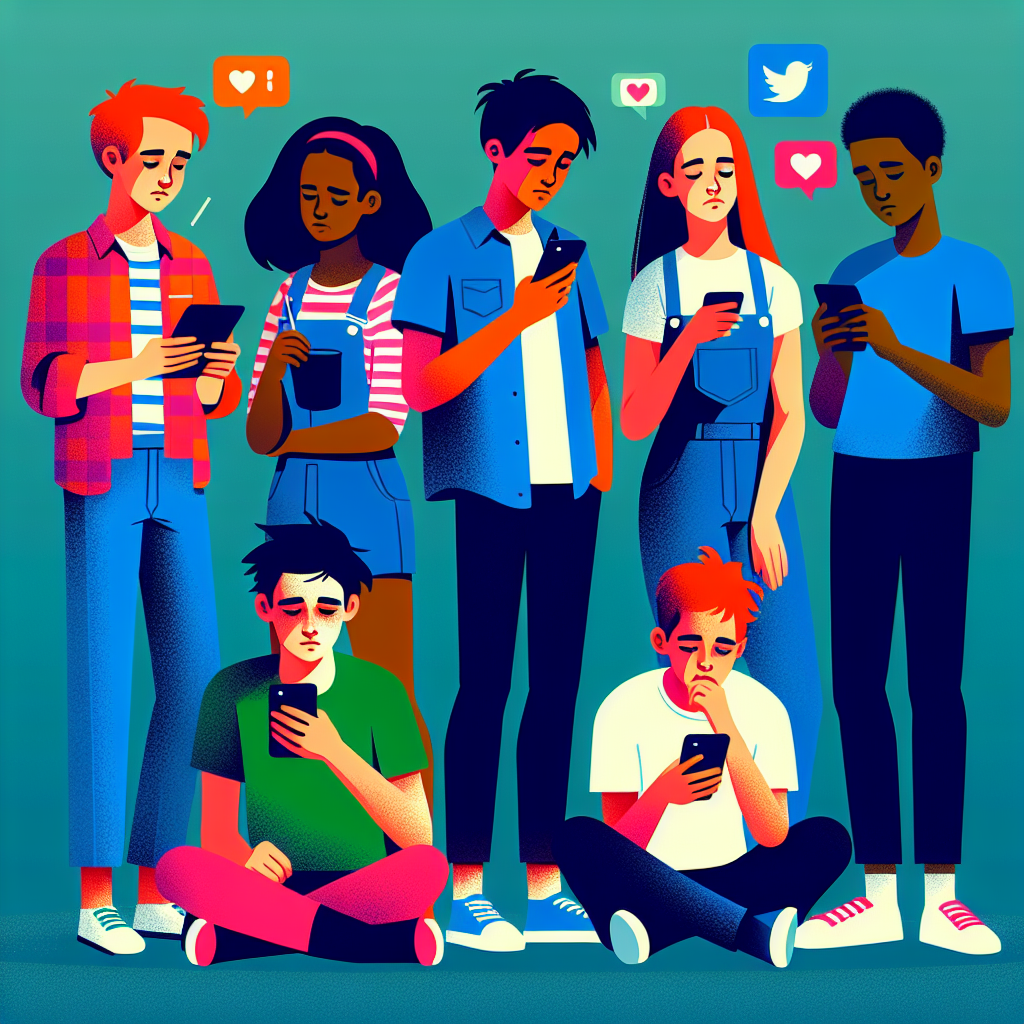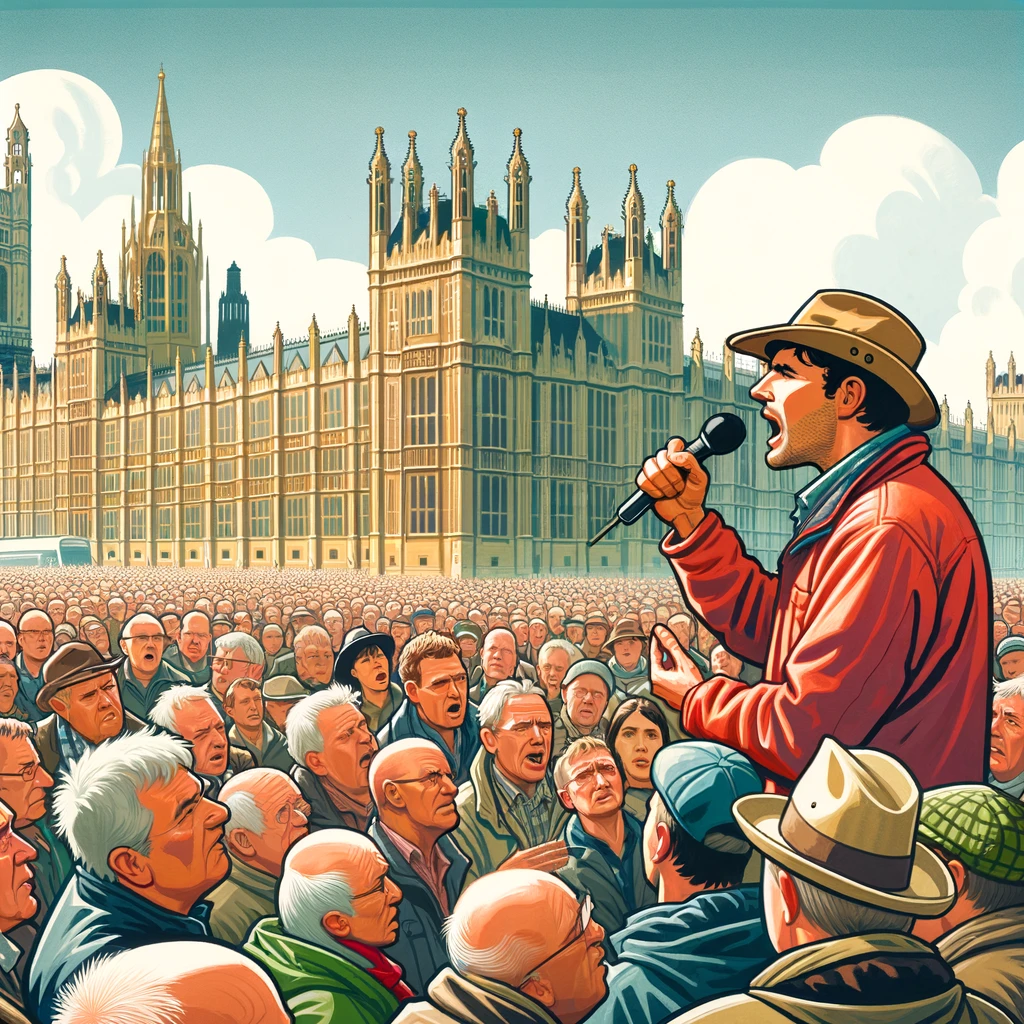The pūteketeke, a native bird of New Zealand, has been named the Bird of the Century in a recent poll. This result came after a controversial campaign by US talk show host John Oliver, who advocated for the vulnerable crested grebe. The Bird of the Year contest, which has been running for almost 20 years, received a record number of votes this year, with over 350,000 ballots cast from nearly 200 countries. The pūteketeke, with its unique appearance, adorable parenting style, and tendency to regurgitate, won over voters and secured the top spot.
John Oliver’s campaign for the pūteketeke gained global attention and caused a frenzy. He described the bird as “weird puking birds with colorful mullets” and even appeared on a chat show wearing a giant pūteketeke costume. Oliver erected billboards in various countries, including New Zealand, Japan, France, and the UK, referring to the bird as the “Lord of the Wings” in a nod to the Lord of the Rings movies filmed in New Zealand. While his campaign was successful, it also faced criticism from those who saw it as American interference in a foreign election.
The intensity of the contest led to some instances of voter fraud, with supporters of other birds attempting to manipulate the results. Despite these efforts, the pūteketeke emerged as the clear winner with over 290,000 votes, while the kiwi came in second place with just 12,904 votes. The kea, kākāpō, and fantail rounded out the top five. This is not the first time the Bird of the Year competition has faced controversy, as last year, the kākāpō was banned from competing after winning twice in the past.
Despite the controversy, the Bird of the Year poll has succeeded in bringing global attention to the plight of New Zealand’s native birds. With over 80% of these birds on the threatened species list, the world is watching how New Zealand cares for its avian population. The pūteketeke’s victory serves as a reminder of the importance of conservation efforts and the need to protect these unique and vulnerable species.
Original news source: Bird of Century: Pūteketeke wins NZ poll after campaign by John Oliver (BBC)
Listen
Slow
Normal
Fast
Group or Classroom Activities
Warm-up Activities:
– News Reporter Role-play
Instructions: Split the class into pairs. One student plays the role of a news reporter, the other is an expert on the pūteketeke and the Bird of the Year contest. The reporter conducts an interview, asking questions about the significance of the contest, the characteristics of the pūteketeke, and the controversy surrounding John Oliver’s involvement. The expert must provide detailed answers, using vocabulary and information from the article.
– Opinion Poll
Instructions: Create a list of statements about the Bird of the Year contest, the involvement of celebrities in conservation efforts, and the importance of protecting threatened species. Students walk around the room and poll their classmates, recording whether they agree or disagree with each statement. Afterward, discuss the results as a class, encouraging students to explain their opinions using language from the article.
– Article Timeline
Instructions: Provide the students with a series of events from the article (e.g., John Oliver’s campaign, instances of voter fraud, the pūteketeke being named Bird of the Century). Ask the students to work in small groups to arrange these events in chronological order on a timeline. This activity helps students practice sequencing and using language related to time and order.
– Vocabulary Pictionary
Instructions: Write down key vocabulary words from the article (e.g., “vulnerable,” “regurgitate,” “frenzy,” “interference,” “conservation”) on slips of paper. Students take turns drawing a word and sketching it on the board without using any letters or verbal clues. Their teammates have to guess the word based on the drawing, which reinforces their understanding of the article’s vocabulary in a fun and interactive way.
– Future Predictions
Instructions: Ask students to imagine the future of the Bird of the Year contest and the conservation of native birds in New Zealand. Students write down their predictions, using modal verbs for speculation (e.g., “might,” “could,” “will”). Then, they share their predictions with the class or in small groups, discussing the likelihood and potential impacts of each scenario. This activity encourages the use of language structures for making predictions and discussing future possibilities.
Comprehension Questions:
1. What species was named the Bird of the Century in a recent New Zealand poll?
2. Who was the US talk show host that campaigned for the crested grebe, and what is the bird commonly known as?
3. How many years has the Bird of the Year contest been running?
4. Approximately how many votes were cast in the Bird of the Year contest this year, and from how many countries?
5. How did John Oliver refer to the pūteketeke in his campaign, and what costume did he wear on a chat show?
6. In what way did Oliver’s campaign for the pūteketeke face criticism?
7. Which bird came in second place in the Bird of the Year contest, and how many votes did it receive?
8. What percentage of New Zealand’s native birds are on the threatened species list according to the article?
Go to answers ⇩
Listen and Fill in the Gaps:
The pūteketeke, a (1)______ bird of New Zealand, has been named the Bird of the Century in a recent poll. This (2)______ came after a (3)______ campaign by US talk show host John Oliver, who advocated for the (4)______ crested grebe. The Bird of the Year contest, which has been running for almost 20 years, received a record number of votes this year, with over 350,000 ballots cast from nearly 200 countries. The pūteketeke, with its unique appearance, adorable parenting style, and tendency to regurgitate, won over (5)______ and secured the top spot.
John Oliver’s campaign for the pūteketeke gained global attention and caused a frenzy. He described the bird as “weird puking birds with colorful mullets” and even appeared on a chat show wearing a giant pūteketeke costume. Oliver erected billboards in various countries, including New (6)______, Japan, France, and the UK, (7)______ to the bird as the “Lord of the Wings” in a nod to the Lord of the Rings movies (8)______ in New Zealand. While his campaign was successful, it also faced criticism from those who saw it as American interference in a foreign election.
The intensity of the contest led to some instances of voter fraud, with supporters of other (9)______ attempting to manipulate the results. Despite these efforts, the (10)______ emerged as the clear winner with over 290,000 votes, while the kiwi came in (11)______ place with just 12,904 votes. The kea, kākāpō, and fantail (12)______ out the top five. This is not the first time the Bird of the Year competition has faced controversy, as last year, the kākāpō was banned from competing after winning twice in the past.
Despite the controversy, the Bird of the Year poll has succeeded in bringing (13)______ attention to the (14)______ of New Zealand’s native birds. With over 80% of these birds on the threatened species list, the world is (15)______ how New Zealand cares for its avian population. The pūteketeke’s victory (16)______ as a reminder of the importance of conservation efforts and the need to protect these unique and vulnerable species.
Go to answers ⇩
Discussion Questions:
Students can ask a partner these questions, or discuss them as a group.
1. What is your opinion on using humor and celebrity influence to raise awareness for conservation efforts?
2. How would you feel if a celebrity from another country became involved in a local campaign in your country?
3. Do you think that involving celebrities in environmental campaigns is effective in bringing global attention to local issues? Why or why not?
4. What are some unique ways you’ve seen people advocate for wildlife conservation in your own country or elsewhere?
5. How do you think the involvement of someone like John Oliver could impact the perception of conservation campaigns among the younger generation?
6. Do you like the idea of a “Bird of the Year” contest to promote awareness of bird species? Why or why not?
7. What is a creative campaign you would propose to raise awareness for an endangered species in your area?
8. Have you ever participated in any kind of wildlife or environmental vote or poll? What was it like?
9. Do you think that playful campaigns like the Bird of the Year contest are more effective than serious ones? Why or why not?
10. How would you feel if a species from your country was named “Animal of the Century” in a global poll?
11. Do you think that campaigns like the Bird of the Year can lead to tangible conservation results? Why or why not?
12. What is your favorite bird, and what characteristics make it special to you?
13. How important do you think it is to protect native species, and what role do you think the general public should play in this?
14. Do you think that voter fraud in contests like these reflects deeper issues in society? Why or why not?
15. Do you believe that New Zealand’s approach to conservation, including contests like this, could serve as a model for other countries? Why or why not?
Individual Activities
Vocabulary Meanings:
Match each word to its meaning.
Words:
1. pūteketeke
2. Bird of the Century
3. John Oliver
4. Bird of the Year
5. voter fraud
6. kiwi
7. kākāpō
8. conservation efforts
Meanings:
(a) Bird that was banned from competing last year
(b) Actions taken to protect and preserve endangered species
(c) Manipulation of the voting process by supporters of other birds
(d) Title given to the pūteketeke in a recent poll
(e) Annual contest to determine the most popular bird
(f) Native bird of New Zealand
(g) Second place winner in the Bird of the Year contest
(h) US talk show host who campaigned for the crested grebe
Go to answers ⇩
Multiple Choice Questions:
1. What bird was named the Bird of the Century in a recent poll?
(a) pūteketeke
(b) crested grebe
(c) kiwi
(d) kea
2. Who campaigned for the pūteketeke to be named Bird of the Century?
(a) US talk show host
(b) New Zealand native
(c) John Oliver
(d) Lord of the Wings
3. How many votes were cast in this year’s Bird of the Year contest?
(a) over 350,000
(b) over 200,000
(c) over 100,000
(d) over 50,000
4. What did John Oliver call the pūteketeke?
(a) adorable parenting birds
(b) Lord of the Wings
(c) unique and vulnerable species
(d) weird puking birds with colorful mullets
5. Which country did John Oliver not erect billboards in for the pūteketeke campaign?
(a) New Zealand
(b) Germany
(c) Japan
(d) France
6. What bird came in second place in the Bird of the Year contest?
(a) kea
(b) kiwi
(c) kākāpō
(d) fantail
7. Why was the kākāpō banned from competing in last year’s Bird of the Year contest?
(a) it faced controversy
(b) it was a threatened species
(c) it received the most votes
(d) it won twice in the past
8. What does the pūteketeke’s victory in the Bird of the Year poll remind people of?
(a) the need to protect unique and vulnerable species
(b) the plight of New Zealand’s native birds
(c) the importance of conservation efforts
(d) all of the above
True or False Questions:
1. The contest received a record number of votes this year, with over 350,000 ballots cast from nearly 200 countries.
2. US talk show host John Oliver campaigned against the vulnerable crested grebe in the Bird of the Year contest.
3. John Oliver’s campaign for the pūteketeke gained global attention and caused a frenzy.
4. The pūteketeke won over voters with its unique appearance, adorable parenting style, and tendency to regurgitate.
5. The pūteketeke, a native bird of New Zealand, has not been named the Bird of the Century in a recent poll.
6. The Bird of the Year poll has not brought global attention to the plight of New Zealand’s native birds, with less than 80% of them on the threatened species list.
7. The pūteketeke did not emerge as the clear winner with over 290,000 votes, and the kiwi did not come in second place.
8. The Bird of the Year competition has faced controversy in the past, with the kākāpō being banned from competing after winning twice.
Go to answers ⇩
Write a Summary:
Write a summary of this news article in two sentences.
Check your writing now with the best free AI for English writing!
Writing Questions:
Answer the following questions. Write as much as you can for each answer.
Check your answers with our free English writing assistant!
1. What is the significance of the pūteketeke being named the Bird of the Century, and how was this title decided?
2. How did John Oliver contribute to the pūteketeke’s win in the Bird of the Year contest?
3. What were the criticisms faced by John Oliver’s campaign for the pūteketeke?
4. How did instances of voter fraud manifest during the Bird of the Year contest, and what was the outcome?
5. What broader message does the pūteketeke’s victory in the Bird of the Year contest convey about New Zealand’s native birds and conservation efforts?
Answers
Comprehension Question Answers:
1. What species was named the Bird of the Century in a recent New Zealand poll?
The pūteketeke was named the Bird of the Century in a recent New Zealand poll.
2. Who was the US talk show host that campaigned for the crested grebe, and what is the bird commonly known as?
The US talk show host that campaigned for the crested grebe was John Oliver, and the bird is commonly known as the pūteketeke.
3. How many years has the Bird of the Year contest been running?
The Bird of the Year contest has been running for almost 20 years.
4. Approximately how many votes were cast in the Bird of the Year contest this year, and from how many countries?
Over 350,000 votes were cast in the Bird of the Year contest this year, from nearly 200 countries.
5. How did John Oliver refer to the pūteketeke in his campaign, and what costume did he wear on a chat show?
John Oliver referred to the pūteketeke as “weird puking birds with colorful mullets” and wore a giant pūteketeke costume on a chat show.
6. In what way did Oliver’s campaign for the pūteketeke face criticism?
Oliver’s campaign for the pūteketeke faced criticism for being seen as American interference in a foreign election.
7. Which bird came in second place in the Bird of the Year contest, and how many votes did it receive?
The kiwi came in second place in the Bird of the Year contest, receiving 12,904 votes.
8. What percentage of New Zealand’s native birds are on the threatened species list according to the article?
According to the article, over 80% of New Zealand’s native birds are on the threatened species list.
Go back to questions ⇧
Listen and Fill in the Gaps Answers:
(1) native
(2) result
(3) controversial
(4) vulnerable
(5) voters
(6) Zealand
(7) referring
(8) filmed
(9) birds
(10) pūteketeke
(11) second
(12) rounded
(13) global
(14) plight
(15) watching
(16) serves
Go back to questions ⇧
Vocabulary Meanings Answers:
1. pūteketeke
Answer: (f) Native bird of New Zealand
2. Bird of the Century
Answer: (d) Title given to the pūteketeke in a recent poll
3. John Oliver
Answer: (h) US talk show host who campaigned for the crested grebe
4. Bird of the Year
Answer: (e) Annual contest to determine the most popular bird
5. voter fraud
Answer: (c) Manipulation of the voting process by supporters of other birds
6. kiwi
Answer: (g) Second place winner in the Bird of the Year contest
7. kākāpō
Answer: (a) Bird that was banned from competing last year
8. conservation efforts
Answer: (b) Actions taken to protect and preserve endangered species
Go back to questions ⇧
Multiple Choice Answers:
1. What bird was named the Bird of the Century in a recent poll?
Answer: (a) pūteketeke
2. Who campaigned for the pūteketeke to be named Bird of the Century?
Answer: (c) John Oliver
3. How many votes were cast in this year’s Bird of the Year contest?
Answer: (a) over 350,000
4. What did John Oliver call the pūteketeke?
Answer: (d) weird puking birds with colorful mullets
5. Which country did John Oliver not erect billboards in for the pūteketeke campaign?
Answer: (b) Germany
6. What bird came in second place in the Bird of the Year contest?
Answer: (b) kiwi
7. Why was the kākāpō banned from competing in last year’s Bird of the Year contest?
Answer: (d) it won twice in the past
8. What does the pūteketeke’s victory in the Bird of the Year poll remind people of?
Answer: (c) the importance of conservation efforts
Go back to questions ⇧
True or False Answers:
1. The contest received a record number of votes this year, with over 350,000 ballots cast from nearly 200 countries. (Answer: True)
2. US talk show host John Oliver campaigned against the vulnerable crested grebe in the Bird of the Year contest. (Answer: False)
3. John Oliver’s campaign for the pūteketeke gained global attention and caused a frenzy. (Answer: True)
4. The pūteketeke won over voters with its unique appearance, adorable parenting style, and tendency to regurgitate. (Answer: True)
5. The pūteketeke, a native bird of New Zealand, has not been named the Bird of the Century in a recent poll. (Answer: False)
6. The Bird of the Year poll has not brought global attention to the plight of New Zealand’s native birds, with less than 80% of them on the threatened species list. (Answer: False)
7. The pūteketeke did not emerge as the clear winner with over 290,000 votes, and the kiwi did not come in second place. (Answer: False)
8. The Bird of the Year competition has faced controversy in the past, with the kākāpō being banned from competing after winning twice. (Answer: True)
Go back to questions ⇧















